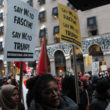(William Barber, lower right with red sash | Source: Raleigh News & Observer)
The Moral Monday Movement (or the Historic Thousands on Jones Street Coalition) registered with the national media last year when it turned out more than 10,000 protesters at the North Carolina State Capitol, in response to extreme measures enacted by Republican supermajorities in the General Assembly. (The Capitol is on Jones Street.) HK on J is perceived as a model for organizing other Southern states. It might be. But social movements require heavy lifting.
| William Barber: “It would make no sense to have civil disobedience with no legal strategy, with no voter registration strategy, with no social media strategy, with no understanding of transformative politics rather than transactional politics.” |
The Rev. William J. Barber II, who began building a sustained movement when he was elected president of the North Carolina NAACP seven years ago, regularly hears from activists. “People call from all over the nation and ask how do we do Moral Monday,” Barber said. “First, I want folks to understand that it’s not something you do. Second, it’s not just going to jail. It would make no sense to have civil disobedience with no legal strategy, with no voter registration strategy, with no social media strategy, with no understanding of transformative politics rather than transactional politics.”
“There is never a Moral Monday event where we pick up a placard and go out and march,” Barber said. “Almost every thing we say in public is written down on paper before we say it.”
The movement, as reported in this issue, was years in the making. And it is built upon the success of the civil rights movement. Barber is steeped in the writing of Martin Luther King Jr. The small group of collaborators working with him include Al McSurely, who in the 1960s was a member of the Congress of Racial Equality, has litigated civil rights for decades, and co-founded an NAACP branch in Chapel Hill; and Tim Tyson, a professor at Duke University, author, and scholar of political movements, race and Southern culture.
The NAACP provided the structure and organizing nexus. But the movement is broader and more diverse than anything imagined by civil rights leaders of the 1960s. Immediate success with the extremist General Assembly is a challenge. Partisan gerrymandered districts mean electoral progress toward a Legislature representative of the state will be slow.
But a voter registration strategy puts statewide races in reach. And the movement has already won in the court of public opinion. By repeatedly turning out huge diverse crowds (often more whites than African Americans) while the Legislature was in session, and using direct action and arrests to call attention to extremist legislation, HK on J turned North Carolina’s Capitol grounds into a public forum. And over the past year drove public support for the governor and legislators into the ground.
Governor Pat McCrory has fallen 30 percent in the polls since he took the oath of office a year ago; only 39 percent of North Carolinians now support him. The Legislature is polling at 24 percent. Yet HK on J (or Moral Monday)—a coalition led by the NAACP in a Southern state—is polling at 50 percent.
Moral Monday organizers are holding regular meetings across the state and HK on J returns to the Capitol on February 8 and will be there when the Legislature reconvenes in May 2014. “It’s like David in the Bible,” Barber told me. “He spent 12 years, or at least five years, fighting bears and lions. All that did was get him ready for Goliath.”
Lou Dubose is the editor of The Washington Spectator.





0 Comments
Trackbacks/Pingbacks